We’ve all been there. Do you remember the horrible advice you got on your first day of paddling? It starts with so much hope and ambition, and it can make or break a person’s passion for paddling. With so much at stake it pays to be wary of beginner kayak tips we hear from well-meaning friends and acquaintances. Instead, first-timers should focus on getting proper instruction from qualified experts.
Learning through the tears
My first instructor was James Roddick. I was 10 and he was patient. I’m thankful James took the time to guide me through the tears. He didn’t tell me what I wanted to hear, he told me what I needed to hear. Unfortunately, too many first-time kayakers and potential enthusiasts don’t have a James.
Maybe they had a friend who told them it would all be fine and to just tag along, or an instructor who passed on information which sounded good but fell apart in action.
I’m convinced whitewater kayaking could boast twice as many paddlers if kayakers’ first experiences unfolded differently.
If you were lucky, you never had to hear any of the following beginner kayak tips. If you did and still kayak, congratulations on persevering.
The worst beginner kayak tips
1. “You have to be able to roll to have fun”
Not so. This is only valid if taken down a big, munchy river on a first outing, which is a recipe for a bad time anyways. The experience beginners gain in a kayak before perfecting the roll is valuable—think boat control, stroke technique and simply being comfortable in the water. Especially when learning on a warm and deep river, having fun and being outside comes first—a roll can easily come second.
2. “One day, you can go kayaking by yourself”
Truly cringeworthy. At one point, we’ve all seen a solo boater paddle past, mullet gracefully tussled by the wind, and wondered, “Will I ever be confident enough to kayak alone?” The answer is no. Even for experienced boaters on their home rivers, we never know when something might go wrong and we might be in need of a helping hand. Solo boating is more risk than reward—and besides, kayaking is way more fun with friends.
3. “You can only run something blind once”
Beginners shouldn’t run anything blind. Faithfully duckying along behind a more experienced paddler doesn’t teach much about reading current, identifying obstacles and creating a strategy if the newbie never gets out of their boat for a new perspective. This advice often stems from a lazy group leader not wanting to take the time to scout a rapid they have run hundreds of times so they say, “It’s good, go down the middle.” Better to scout and style, than blindly crash and burn.
4. “You don’t need your boat or gear to fit you until you get more into the sport”
No one says this about running shoes, so why say it about boats? The fact is, the right paddle, a few pieces of hip foam and a foot block can make the difference for students learning to roll and even just controlling a kayak. The added benefit of a well-fitting boat is all energy is transmitted into your desired movement—especially confidence-inspiring for beginners.
5. “Do it for the ‘Gram”
Worst motivating logic ever. If ever doing anything to impress someone else, you’re doing it for the wrong reason. This is a philosophy extending far beyond kayaking too. Ask yourself: If no one was to ever find out, would I still want to do this thing? If the answer is no, you have your decision.
6. “Paddle hard!”
When instructors tell beginners to paddle hard, what they usually mean is they want the beginner to keep paddling in rapids to maintain stability and momentum. So just say so. Shouting “paddle hard” before each set creates the notion force, as opposed to finesse, is what gets someone down a river. And all the flailing is exhausting for the rest of us to watch.
7. “Don’t worry, you’ll be fine”
Red flag. The single worst piece of advice to give or receive. Often overheard stated by a group of friends who want someone to learn, but don’t want to sacrifice a day to teach at an appropriate pace. All too often beginners are roped onto rivers too steep, fast and consequential. A bad swim can turn someone off entirely. If you take the time to introduce a friend, really take the time and make sure it’s as much fun for them as it is for you.
This article was first published in Issue 55 of Paddling Magazine. Subscribe to Paddling Magazine’s print and digital editions, or browse the archives.
Just keep swimming. | Feature Photo: Gabriel Rivett-Carnac


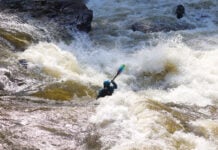
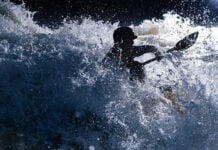
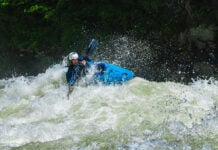
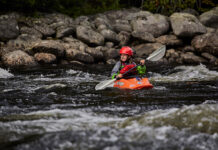
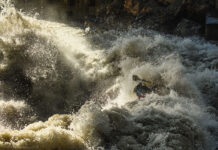

2. “One Day, You Can Go Kayaking By Yourself” No???
In the very same email where the lead story is how risk management is sucking the life out of kids paddling trips.
Get some perspective on the real risks in life.
Solo paddling can be a great experience, there is no reason anyone with some skill can’t go out alone in many areas around the country.
I have to disagree with this article’s dictatorial stance on paddling alone. No one should ever be confident enough to paddle alone? C’mon! Solo paddling is more risk than reward? Heck, driving to and from the water is probably the most dangerous part of paddling, alone or otherwise. When one is dressed for immersion, when one has skills sufficient for the conditions, when one has respect for the elements, and when one has methods for contacting people for help in an emergency, then paddling alone can be quite a reasonable thing to do. I, personally, have found the reward on every single solo paddle I have done, whether in a canoe or a kayak, to have always been worth the risk that I was undertaking. You know what is worse than paddling alone? Not paddling at all because you were told, in no uncertain terms, to never paddle alone.
Great warning for beginner looking to get into it…but nothing is said about HOW to actually ensure you’re getting proper instruction or where to start as a beginner.
All good “bad” tips. Surprising that people would think it’s okay to paddle solo. You should not be so eager to prove you are so full of yourself that no one else wants to paddle with you. #wateralwayswins
One more tip called “The 8 Worst Tips Given To Beginner Kayakers”
Don’t bring a first time kayaker on a (salt water) tidal river a long distance where they have to fight against the wind and incoming tide. You’ll end up towing that beginner kayaker the entire way back. Don’t rely on the trip organizer, but read and know the tides yourself.
One more tip called “The 8 Worst Tips Given To Beginner Kayakers”
Don’t bring a first time kayaker on a (salt water) tidal river a long distance where they have to fight against the wind and incoming tide. You’ll end up towing that beginner kayaker the entire way back. Don’t rely on the trip organizer, but read and know the tides yourself.
Paddle alone …bad
Paddle with one other …you have a witness
Paddle with two others…you have a rescue